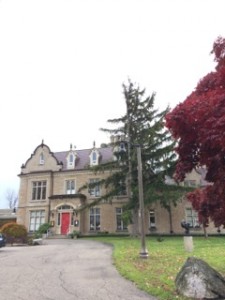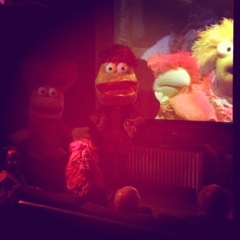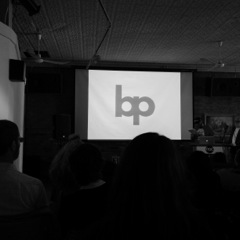Community
November 10, 2014
Avant Canada: poets, prophets, and revolutionaries: Thoughts on the Conference
By Julia Polyk-O’Neill
For the past three days, I’ve been attempting to take in one of the most exciting and poignant conferences I’ve ever attended. This conference, Avant Canada, held at my home institution (Brock University) and organized by my doctoral supervisor, Gregory Betts, and a committee made up, largely, of scholars I know (because of EMiC), is steeped in fascinating—and timely—discussions and debates. It has been overwhelming, but, in many ways, wonderful.
Many of the delegates are artists, poets, and scholars I have studied intensively. I volunteered at the registration desk on day one and kept doing double takes, realizing I was face to face with the human beings who produced the words I reflected on and often reproduced within my writings. The realization that these words, with which I spent such extended hours in a state of deep contemplation, came from human beings (many of whom reacted generously to my enthusiasm at connecting these proverbial dots) was initially jarring, but often throughout the week, when my mind would drift to a place of inner-calm (more on why this was necessary in a bit), I would turn this experience over anew and feel incredibly fortunate. I would return to the moment of having my paper accepted, to seeing the poster with these names, mine placed conspicuously (I felt) amongst them, and would quickly spring back to the present moment, remembering that this was special, a once in a lifetime experience.
I presented my paper on Day One, and thrilled at the reality that many of the poets and scholars I was discussing, or citing, were in the same building as I was. As the hours unfolded and my presentation time approached, a sense of calm set in. I was presenting alongside one of my EMiC colleagues, Kailin Wright, and our panel chair was none other than EMiC director Dean Irvine. I had registered the other two panelists (I volunteered at the registration table that morning), and knew I had nothing to be afraid of (if you’ve attended at least a handful of conferences, you know that there are certain things—character flaws or ‘eccentricities’—one might encounter in panel situations. Or maybe I’m just lucky). I felt pretty good about everything then, and, having made it through the presentation unscathed (with a few very good audience questions, too!), I feel great about how everything transpired.
Reflecting on my panel experience, I feel compelled to comment upon the incredible value of being a member of the EMiC community. As a relative latecomer to the project, I had the privilege of attending the final TEMiC summer institute a mere four months ago, where I met some truly exceptional scholars and enjoyed many invigorating seminars and late-night conversations at UBCO in beautiful Kelowna, B.C. We were collectively immersed in theories of textual editing, and each afternoon, enjoyed presentations by poet-scholars that related to the content of our more structured in-class discussions. Avant Canada, being a conference sponsored and organized by EMiC, brought a similarly collegial atmosphere. This suggests—and it is not an aberrant leap in logic—that there is a certain culture to EMiC-related events—one that foregrounds the importance of both the scholarly and the personal, as the events of the conference were structured according to a model that allows for much scholarly and social interaction, resulting in the creation or reinforcement of networks. When an event serves to bring together or create a mutually supportive community, even a remarkably diverse community (despite the common interest in avant-garde theory, politics, and poetics), the event and its effects become meaningful, and develops a life beyond the boundaries of its temporal and material contexts.
My panel was followed by a rather heavy roundtable, “The Female Future-Garde in Canada”, that addressed feminist strategies, as well as certain contentions within academe and publishing, and resulted, rather organically, in the sharing and unpacking of topical and triggering narratives. The evening’s keynote presentation was delivered by one of the most powerful speakers I’ve ever seen, Lee Maracle, who spoke of the grave injustices inflicted upon the Indigenous peoples of Canada and beyond, and the importance of cultural memory, and of family. I ruminated on my privilege throughout the night, at the constant joking about ‘first world problems’ that goes on between myself and my colleagues, and how, despite my fierce involvement in student politics and the growing of communities within my home institution and extremely diverse (but modestly-scaled) program, I often feel alienated, perhaps because I focus so compulsively on research and professional development, leaving little time to spend with family.
On the second day of the conference, I felt compelled to attend to some academic duties and missed Dean’s reference to some material in my paper (specifically Stephen Scobie’s work, Computer Poem, from 1968-9—and I should note that Professor Scobie was at the conference and has agreed to an interview on the topic of this under-archived work!), and when he mentioned his acknowledgement of my research, again, I felt my privilege. This was magnified during the third day, a symposium on the work of bpNichol, “At the Corner of Mundane and Sacred”, as I have been working as a research assistant for Gregory’s bpNichol project and am now, thanks to a very fancy book scanner, intimately familiar with Nichol’s work, having spent long hours struggling to scan some unusually-formatted (and quirky—as in, what is the title? Is this upside-down? How do I scan a 3D object?) texts for the archive. Coach House’s Stan Bevington’s presentation, “Small Press Workshop: Making the Avant” (with poet-cum-narrator Neil Hennessy’s often-comedic accompaniment), was particularly interesting to me, as Journeying & the returns (1967), the text he spoke to, was one of the first ‘unconventional’ Nichol texts I scanned. Bevington gave valuable context to the work’s material concerns, and the discussion that resulted from the day’s events was surreal—people exchanged Nichol (or “beep”) anecdotes and I eagerly took notes, as many in attendance did. I spent the day agonizing about all the possible mishaps that might shape my first time co-hosting a poetry reading, but nothing terrible happened thanks to an incredible support network comprised of friends and colleagues, old and new. In fact, I danced the night away with larger-than-life Fraggles.
In short, being surrounded by and engaging with mentors for a three-day period has powerful effects. Being a member of EMiC (even as a latecomer, and even as the termination of the project is imminent), and having a sense of belonging at an event like Avant Canada, was, and will continue to be, a positive and generative influence in my research and scholarly development.


